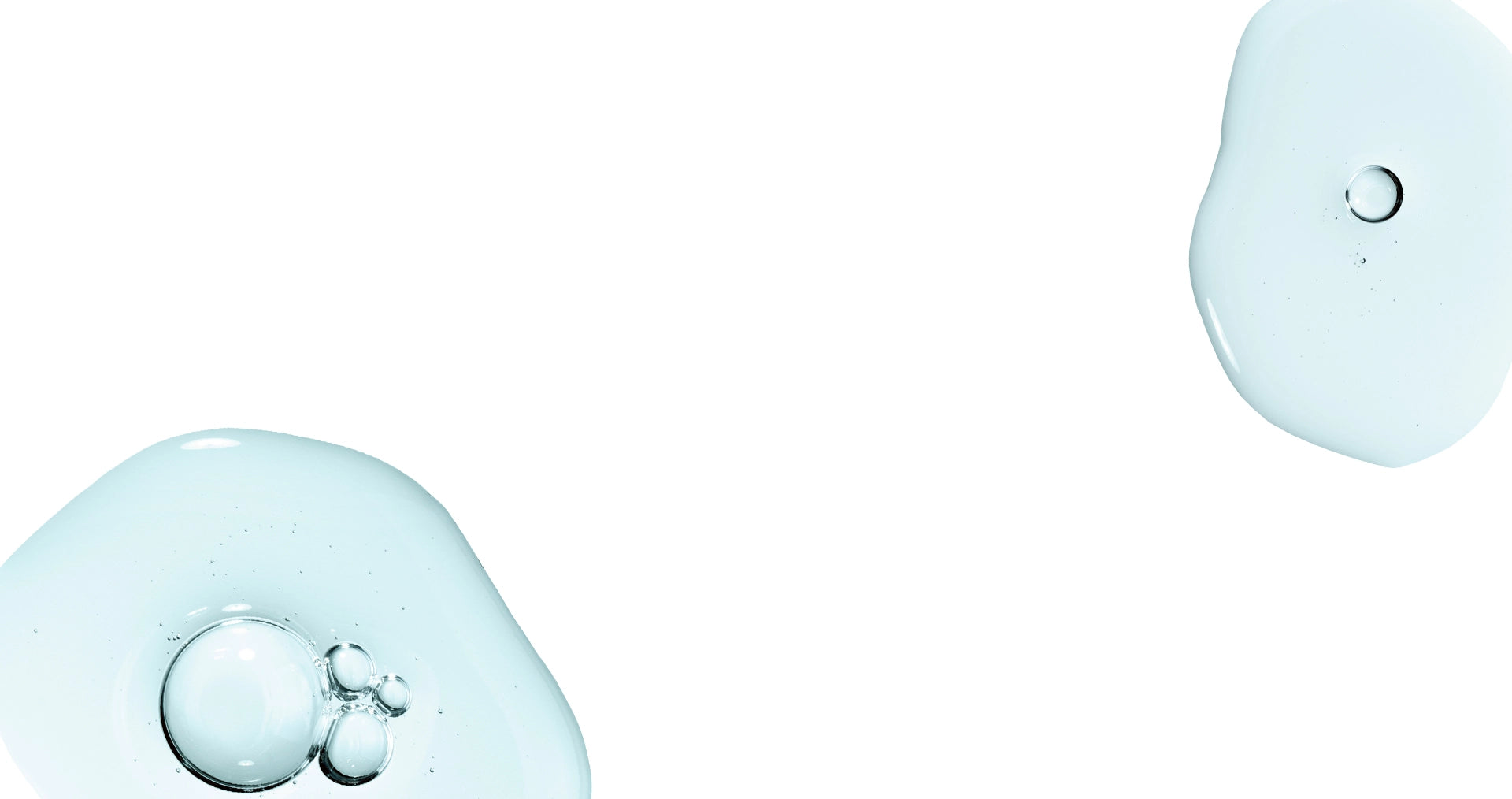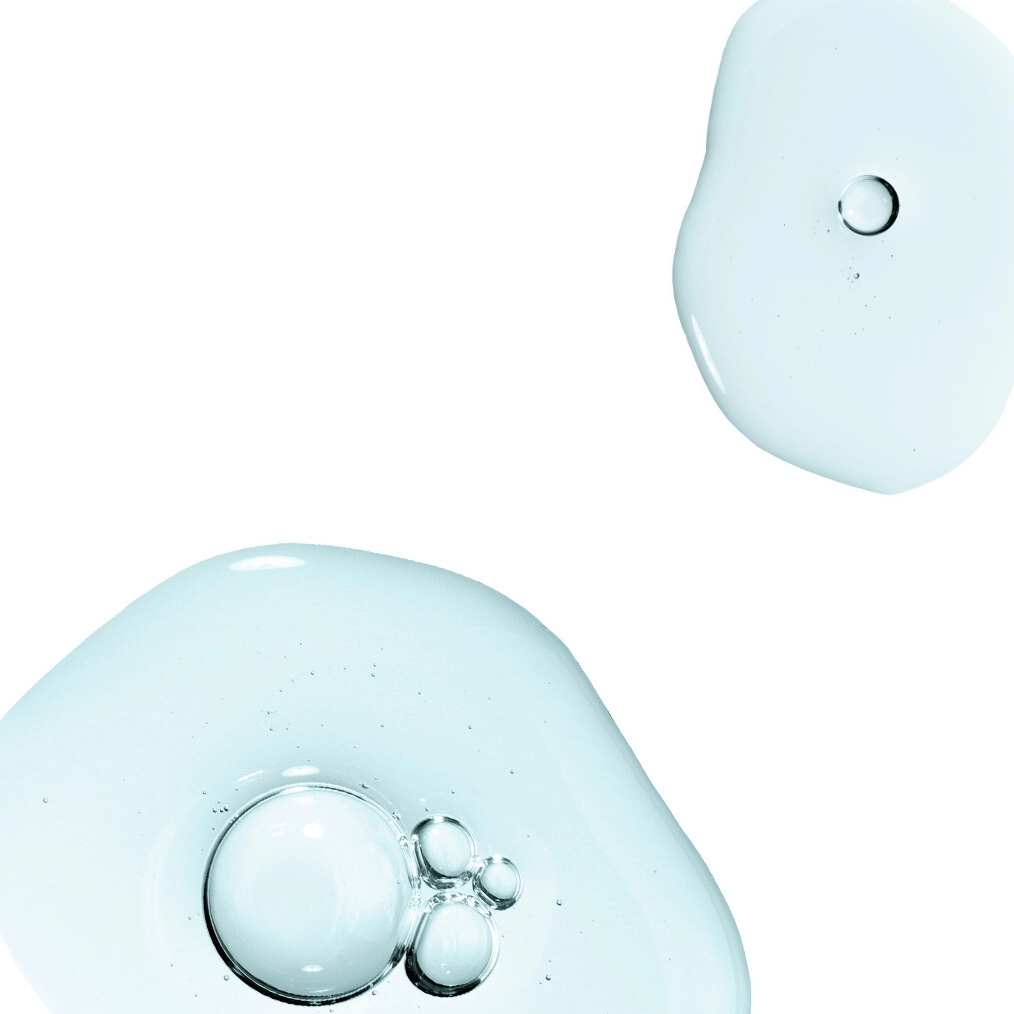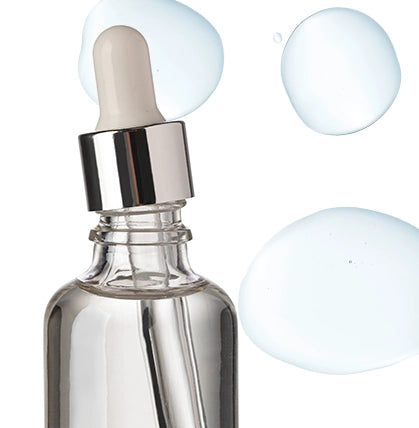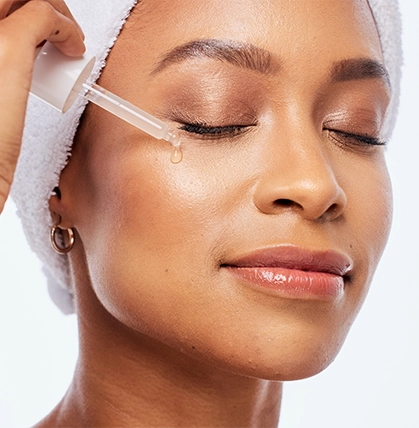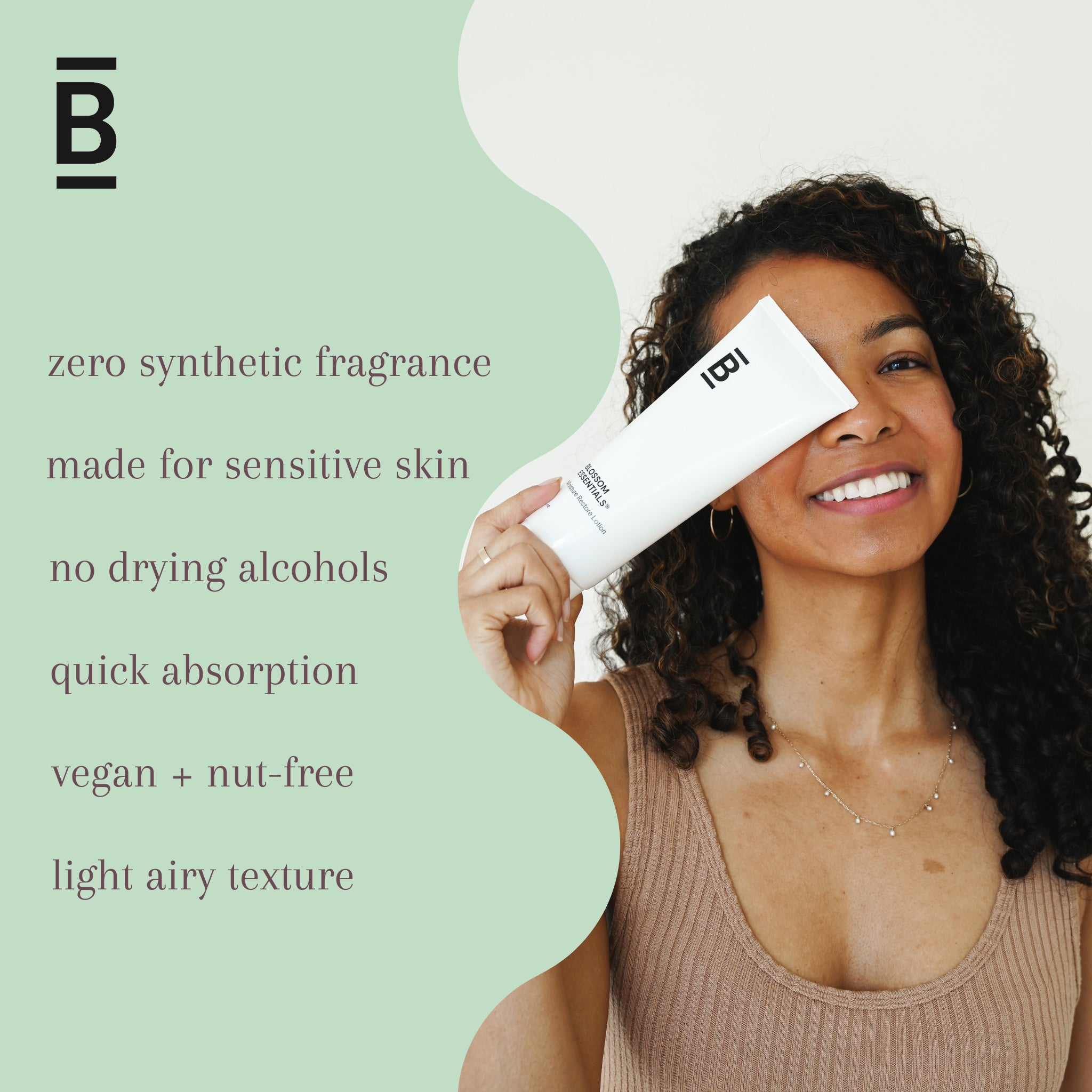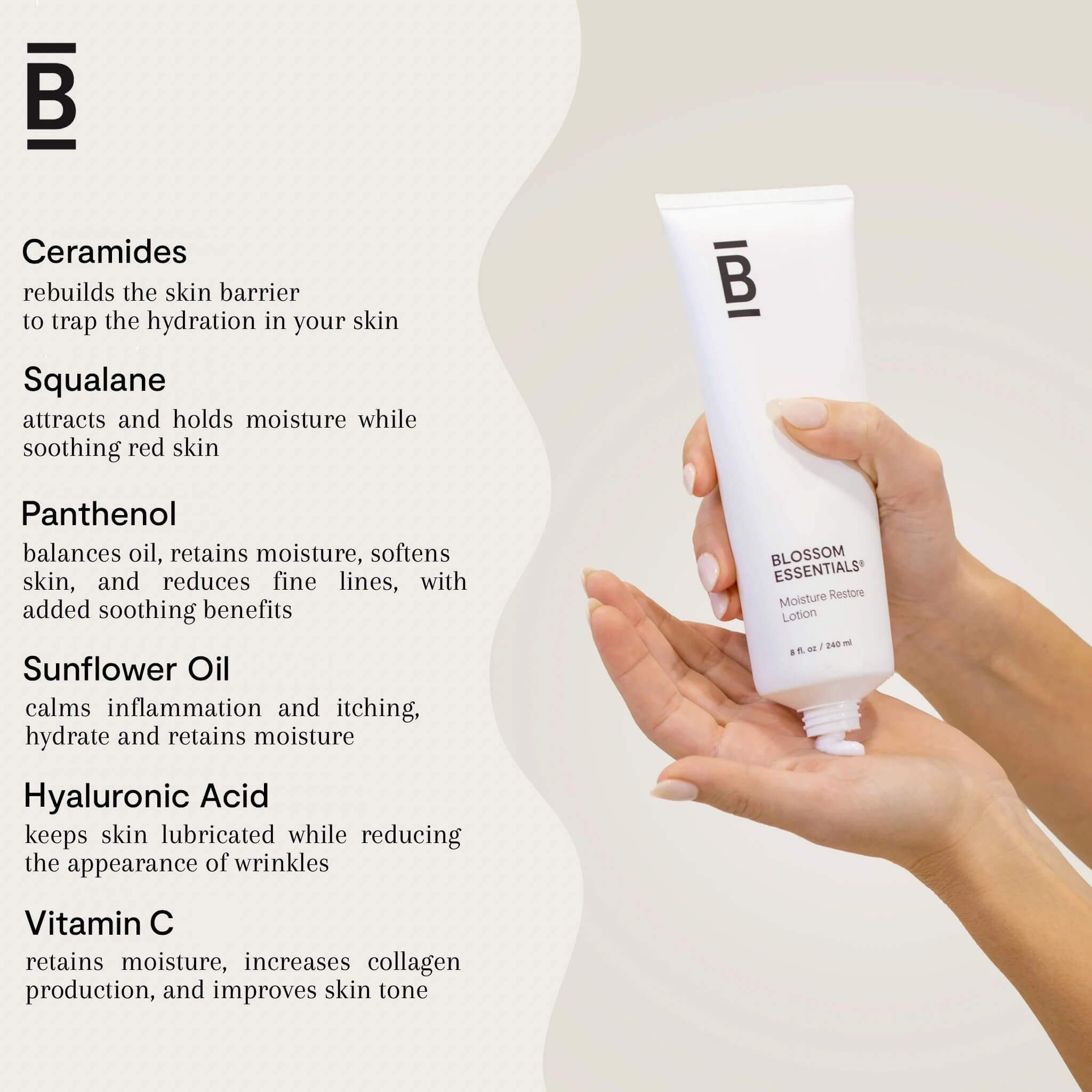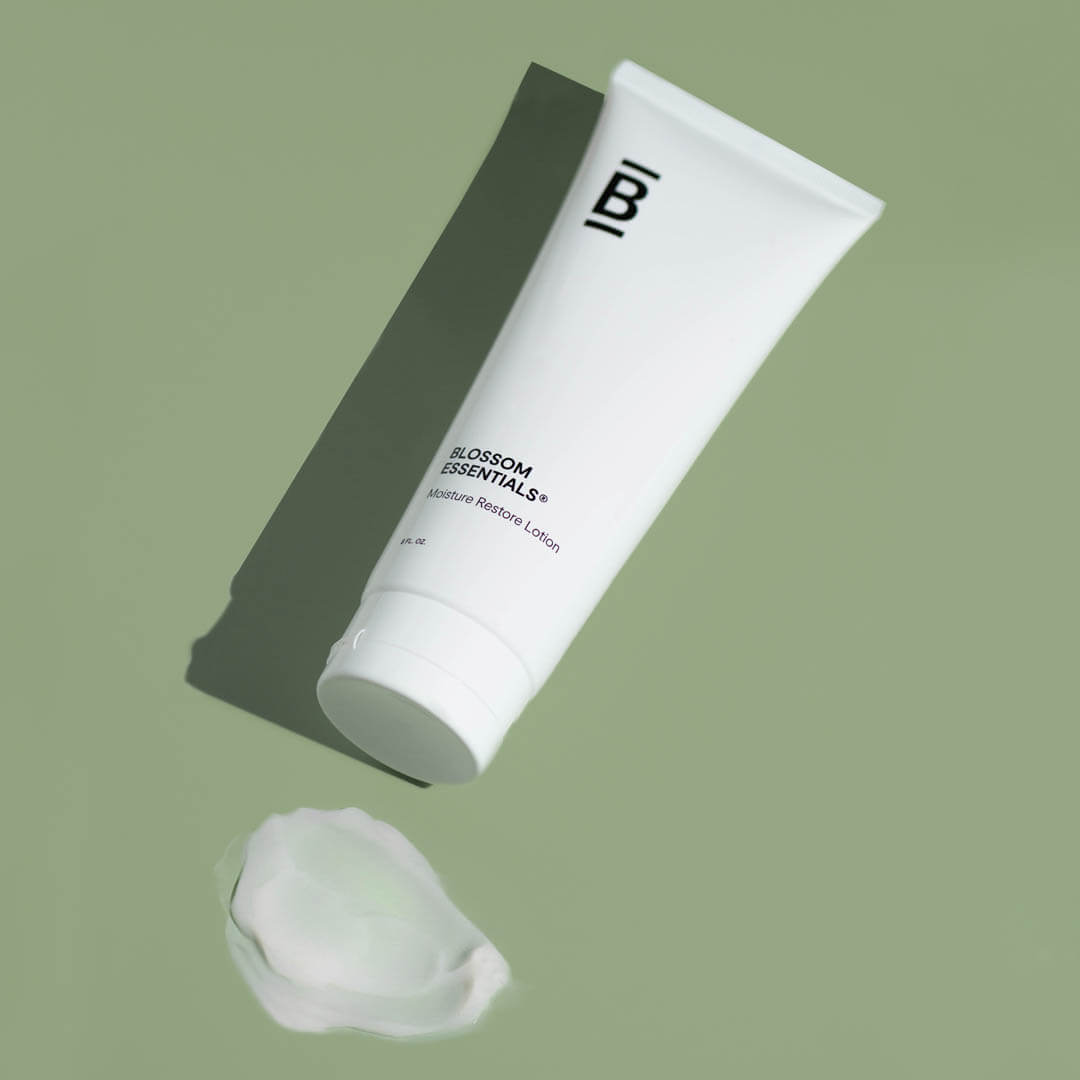A barrier-repairing vegan blend with ceramides, antioxidants, and skin-soothing ingredients, all in a lightweight, cooling texture for lasting hydration. (8 fl. oz)
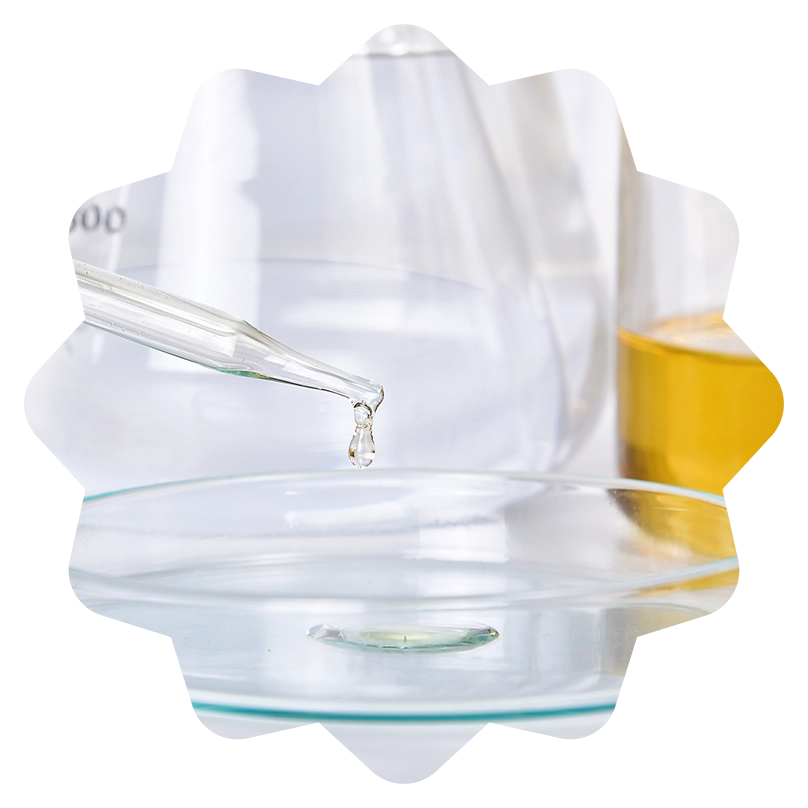
Squalene Fast Facts
- Squalene is a natural oil found in human sebum and plant sources like olives and sugarcane. Our bodies produce it all the time, but production decreases with age.
- First isolated in 1906 from shark liver oil, squalene has a long history in skincare. Today, ethical concerns have led to a shift towards plant-derived squalene, making it a sustainable and cruelty-free ingredient in modern cosmetics.
- Squalene is a powerful antioxidant, protecting your skin from free radical damage and environmental stressors.
Squalene’s molecular structure mimics our skin’s natural oils, allowing it to penetrate deeply and provide long-lasting hydration without feeling greasy. - Squalene is also non-comedogenic, so it won’t clog pores – making it suitable for all skin types, even oily and acne-prone skin.
A Long-Loved Moisturizing Marvel
Squalene is a naturally occurring lipid, specifically a hydrocarbon, renowned for its significant role in skincare due to its exceptional moisturizing properties. Historically, squalene has been utilized in various cosmetic formulations, including creams, oils, and body washes, as a natural remedy for dry and aging skin. Its longstanding presence in the skincare industry is attributed to its unique ability to enhance skin hydration and elasticity.
Chemically, squalene is an unsaturated oil characterized by a structure of 30 carbon atoms and six double bonds. This configuration allows it to closely mimic the natural oils produced by human skin, and it is precisely this structural affinity that facilitates its seamless integration with the skin’s lipid barrier, thereby enhancing hydration and elasticity.
The historic use of squalene in cosmetics, however, has not been free of controversy, as the compound was at one point predominantly sourced from shark liver oil, where it is naturally abundant. Over time, ethical and sustainability concerns have prompted a shift towards plant-based alternatives, and today, the squalene used in cosmetics is almost exclusively commonly derived from olives, amaranth seeds, rice bran, and wheat germ, offering a sustainable and cruelty-free production method. When these plant-based sources are used, extraction techniques such as cold pressing or solvent extraction are employed to preserve the oil’s integrity and efficacy. Additionally, advancements in biotechnology have enabled the synthesis of squalene through fermentation processes using yeast or bacteria, further expanding its availability in the cosmetics industry and beyond.
Squalene’s connection to skincare is deeply rooted in its ability to moisturize and protect. As a key component of human sebum, it naturally aids in maintaining skin suppleness and hydration. Its emollient properties allow it to penetrate the skin effortlessly, providing a lightweight, non-greasy layer of moisture. Scientific research has demonstrated that squalene significantly improves skin hydration, reduces the appearance of fine lines, and enhances overall skin texture. This makes it particularly beneficial for individuals with dry or sensitive skin, as well as those seeking to mitigate the signs of aging.
Beyond its moisturizing capabilities, squalene possesses antioxidant properties that offer additional protection against environmental stressors such as UV radiation and pollution, which can accelerate skin aging. By neutralizing free radicals, squalene helps maintain the skin’s youthful appearance and resilience.
As we delve further into the potential of squalene, subsequent sections will explore its diverse benefits and applications in skincare. From its role in anti-aging formulations to its soothing effects on irritated skin, squalene remains an indispensable ingredient in contemporary skincare regimens. This exploration will reveal how squalene can transform and enhance your skincare routine, solidifying its status as a natural wonder in the field of dermatology.
Squalene Science: Bridging Biology and Beauty
Given its significant applications in cosmetics, pharmaceuticals, and nutraceuticals, there is an abundance of research available on squalene and its unique properties. In a recent article, published in Wiley’s Engineering in Life Science journal in August 2024, Shalu et al. praise squalene’s antioxidant activity, high skin penetrability, and immune system enhancement, stating that “[Squalene] penetrates the deep skin layers and helps counteract fine lines and dry patches by retaining moisture, providing elasticity, and improving the flexibility of the skin”, making it a highly sought-after ingredient in many skincare products.
In their paper from March 2024, Raaj et al. highlight the importance of squalene as a major component of skin sebum, which is an oily substance found around hair follicles at the skin’s surface that protects the skin from outside contaminants and keeps it from drying out. Furthermore, as well as recognizing squalene for its excellent moisturizing properties, the researchers detail “the [positive] effects of squalene on the skin’s inflammatory response and its contribution to the intricate process of wound repair”. Finally, they mention squalene’s ability to combat oxidative stress, or the proliferation of free radicals, as being a valuable addition to skincare formulations, promoting general skin health and aiding in the amelioration of common skin ailments.
Despite being naturally produced by human skin cells and being one of the most prevalent lipids in the skin, Satish et al. (2022) state that squalene synthesis naturally declines with age, and dramatically so as of around the age of thirty, which can contribute to dry skin, making its supplementation in skincare products aimed at middle-aged and older users even more beneficial. Indeed, the same research group mention squalene as an important ingredient in products aimed at managing atopic dermatitis, which itself becomes more and more prevalent with age. Continuing with the substance’s age-related benefits, they also go on to support Raaj et al.’s position that squalene’s unique chemical structure allows it to function effectively as an antioxidant and anti-inflammatory agent.
A 2021 study by Pavlou et al. goes beyond the moisturizing and protective properties of squalene to underscore the substance’s utility as an excipient or carrier for other lipids, stating that, when compared to 18 other different natural oils, “squalene could form the most stable emulsions”, making it a preferred choice for formulations. Furthermore, they state that squalene has also shown great potential as a carrier for drugs in the treatment of psoriasis thanks to its excellent skin penetration properties. Perhaps more interestingly, the researcher’s also point out that other common cosmetic ingredients’ active properties, such as organ oil’s antioxidant and anti-aging effects, are due in part to their “relatively high amounts of squalene and unsaturated fatty acids”.
Other papers, such as Basim et al.’s 2024 work examining squalene’s use in vaccine production and skincare, highlight its ability to maintain skin health, protect against UV radiation, and enhance skin barrier function. The study discusses squalene’s crucial role as a precursor in the synthesis of cholesterol, steroid hormones, and vitamins in humans and animals, all of which are contributing factors to its ability to moisturize and protect the skin at both a surface level and at depth.
Finally, regarding the potential ethical concerns of traditional squalene production (derived from shark liver oil), we can return to Shalu et al.’s 2024 study, where the team examine some fascinating developments in the production of squalene. Given the surge in demand for sustainable and cruelty-free cosmetics, biotechnological advancements in squalene production have led to breakthroughs using microorganisms like yeasts that can reduce environmental impact while meeting commercial needs through efficient and eco-friendly production methods. This area is also explored by Yarkent and Oncel (2021), who conclude that “microalgae are a good candidate as squalene producers, with easily cultivation potential”.
Adding Squalene to Your Hydration Routine
The amazing hydrating benefits of squalene make it the perfect ingredient for inclusion in skin care routines, and can be especially beneficial to the following groups:
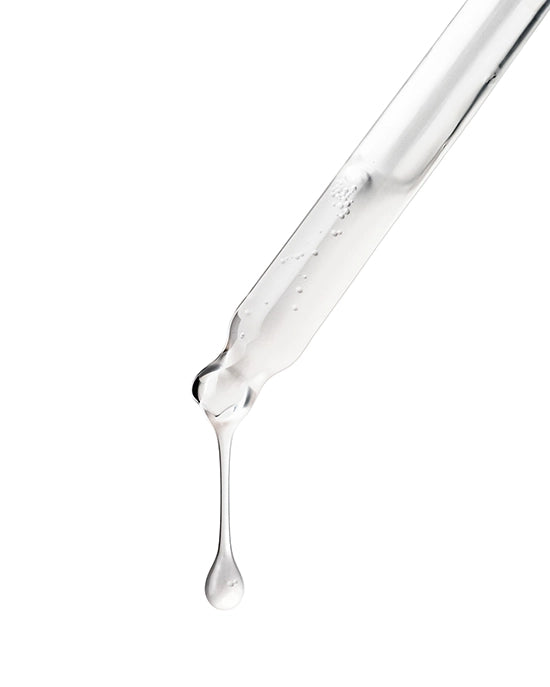
💦 Middle-Aged or Older Adults: To combat the natural decline of squalene production in the skin, enhancing moisture and elasticity, and for its anti-aging benefits, reducing fine lines and improving skin texture.
💦 Post-Menopausal Women: To address increased dryness and loss of skin elasticity.
💦 Pregnant or Postpartum Women: For soothing and moisturizing sensitive skin.
💦 Dry Skin Type: To provide deep hydration and improve skin suppleness.
💦 Sensitive Skin Type: For its gentle, non-irritating properties that help soothe and protect.
💦 Aging Skin Type: To reduce the appearance of fine lines and improve overall texture.
💦 Psoriasis Sufferers: As a carrier for other treatments due to its excellent skin penetration.
💦 Urban Dwellers: To protect against pollution and environmental damage.
💦 Outdoor Enthusiasts: For protection against UV radiation and oxidative stress.
Sources
1. Basim S. A. Al Sulivany* and Husni A. Mhammad, SQUALENE EXPLORING ITS VITAL ROLES IN VACCINE PRODUCTION, SKIN CARE, CHOLESTEROL METABOLISM, ANTI-CANCER STRATEGIES, CARDIOVASCULAR HEALTH, AND ANTIOXIDANT POTENCY. Bull. Pharm. Sci., Assiut University, Vol. 47, Issue 1, 2024, pp.437-448.
2. Giuseppe Lippi, Giovanni Targher, and Massimo Franchini, 2010. Vaccination, Squalene and Anti-Squalene Antibodies: Facts or Fiction? in European Journal of International Medicine.
3. Pavlou, P.; Siamidi, A.; Varvaresou, A.; Vlachou, M. Skin Care Formulations and Lipid Carriers as Skin Moisturizing Agents. Cosmetics 2021, 8, 89. https://doi.org/10.3390/cosmetics8030089
4. Morgan NR, Magalingam KB, Radhakrishnan AK, Arumugam M, Jamil A, Bhuvanendran S. Explicating the multifunctional roles of tocotrienol and squalene in promoting skin health. Skin Health Dis. 2024; e448. https://doi.org/10.1002/ski2.44812 of 12 - MORGAN ET AL. 2690442x, 0, Downloaded from https://onlinelibrary.wiley.com/doi/10.1002/ski2.448
5. Satish DA, De A, Gala MYN, Muchchala SS, Rathod R. Moisturizers Free of Paraben, Mineral Oil, Alcohol and Ingredients from Animal Origin (Pama) - A New Way Forward. J Clin Investigat Dermatol. 2022;10(1): 6
6. Saseendran Shalu Panam Kunnel Raveendranathan Karthikanath, Vinoth Kumar Vaidyanathan, Lars M. Blank Andrea Germer, and Palanisamy Athiyaman Balakumaran, 2024. Microbial Squalene: A Sustainable Alternative for the Cosmetics and Pharmaceutical Industry – A Review. in Engineering in Life Sciences
7. Çağla Yarkent and Suphi S. Oncel, 2022. Recent Progress in Microalgal Squalene Production and Its Cosmetic Application. in Biotechnology and Bioprocess Engineering.

